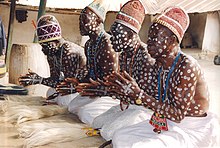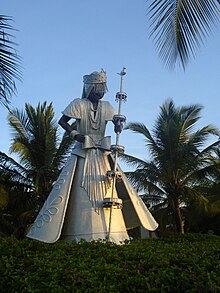Obatala
Obatala (Obàtálá; Obatalá; Oxalá; Òrìşànlá; Orixanlá; Òrìsànlá; Orixalá; Oxalufã) is in the religion of the Yoruba , in the Cuban Santería and in the Brazilian Candomblé, the great creator deity , who made the people out of clay . Because he was drunk in the process, he also created disabled people.
He is the God of peace and grace, purity and wisdom. His name Obatala means "master of white clothes". He is the patron of disabled and injured people and the elderly.
Its color is white and the day dedicated to it is Friday, which is why many believers in the Brazilian state of Bahia only wear white clothes on this weekday.

Mythical ideas / legends
According to the creation myth of Ile-Ife , Obatala is said to have received the commission from Olodumare to create the earth. But when he got drunk with palm wine on the way from heaven to earth and he fell asleep, Oduduwa took the instruments of creation from him and created the earth on the primordial ocean in his place. Because of this incident, Obatala's adepts avoid drinking palm wine.
According to another myth , he was once the only Orisha . An unfaithful servant smashed it with a boulder, and it shattered into many pieces, all of which became orishas. However, Orunmila collected many pieces and put them back together. This became Orishanla, the "great Orisha".
Appearance
He is known for his orderliness, generosity, his rejection of violence, and his calm, reserved, and trustworthy prudence. His followers are characterized by the fact that they are slow and therefore always late, do not like to be criticized, but are good-natured and forgive others for everything.
In Africa: Its annual festival in Ile-Ife
In the cultural center of the Yoruba, Obatala is the most important god after Oduduwa . In his honor, his followers celebrate the annual Itapa festival, in which he is portrayed as a dying and resurrecting god . He leaves his temple in the city on the seventh day of the festival, spends a day in his underworld grove in front of the city and returns to his temple on the ninth day in a triumphant resurrection procession. The three-day rhythm and his moral integrity bring him close to the pre-canonical Yahweh and the mythically transfigured Jesus .
| Colours | a silvery, pure white |
|---|---|
| numbers | 8th |

In the Americas: Cuba and Brazil
Obatala is divided into eight to 45 caminos (aspects) , depending on the Santería design.
The following legends are told in Brazil:
- Orixanlá creates the earth / Orixanlá cria a Terra
- Obatalá creates people / Obatalá cria o homem
- Obatalá creates Icu, death / Obatalá cria Icu, a Morte
- Obatalá provokes envy and is smashed into a thousand pieces / Obatalá provoca a inveja e é feito em mil pedaços
- Obatalá accidentally injures his wife Iemu / Obatalá fere acidentalmente sua esposa Iemu
- Orixalá keeps a feather from Ecodidé as a memory / Orixalá guarda de lembrança uma pena de Ecodidé
- Oxalá saves his children with the help of Orunmilá / Oxalá salva seus filhos com ajuda de Orunmilá
- Oxalá breeds the Angola chicken (helmet guinea fowl) and scares away death / Oxalá cria a galinha-d'angola e espanta a Morte
- Oxalá is forbidden to eat salt / Oxalá é proibido de consumir sal
- Oxalá becomes albino / Oxalá é feito albino por Exu through Exu
- Obatalá separates heaven from earth / Obatalá separa o Céu da Terra
- Obatalá robbed the blind fisherman / Obatalá rouba o pescador cego
- Oxalá drives out the son whose name is money / Oxalá expulsa o filho chamado Dinheiro
- Orixalá receives the honey from Odé / Orixalá ganha o mel de Odé
- Oxalufã is bathed in fresh and clean water when he comes out of prison / Oxalufã é banhado com água fresca e limpa ao sair da prisão
- Obatalá wears the crown of Ecodidé and is called the King of the Orixás / Obatalá usa a coroa de ecodidé e é chamado rei dos orixás
There is an old and a young Oxalá: Òrìşà Olúfón (Oxalufã) and Òrìşà Ògiyán (Oxaguiã).
literature
- E. Bolaji Idowu: Olodumare: God in Yoruba Belief , London 1962.
- Dierk Lange: The dying and the rising God in the New Year Festival of Ife , in: Lange, Ancient Kingdoms of West Africa , Dettelbach 2004, pp. 343-376.
- -: Preservation of Canaanite creation culture in Ife (9.3 MB; PDF),
in: P. Probst and G. Spittler (eds.), Between Resistance and Expansion , Münster 2004, pp. 125–158. - Reginaldo Prandi: Oxalá - Obatalá - Orixanlá - Oxalufã . In: Mitologia dos Orixás. São Paulo: Companhia das Letras 2001: 500-523.
Web links
- Dr. Hans Gerald Hödl, lecture from 2003: African Religions II - Introduction to the religion of the Yorùbá ( Memento from March 15, 2007 in the Internet Archive ) (PDF, 1.9 MB)
- Thomas Altmann ( Memento from July 16, 2007 in the Internet Archive ), article from 2004: Yoruba-Religion (Lukumí) ( Memento from July 2, 2007 in the Internet Archive ) and many links Concerning Afro-Caribbean Religion, Santería and Batá Drumming ( Memento of March 10, 2005 in the Internet Archive ) (October 2004)
- Kerstin Volkenandt: ( Memento from September 13, 2001 in the Internet Archive ) Chapter 6.1 of the essay: Olodumare and the Orishas ( Memento from October 11, 2002 in the Internet Archive )
swell
- ^ Lange, "Dying and rising god," 359-366.
-
↑ THE LUCKY MOJO ESOTERIC ARCHIVE 45 PATHS of OBATALA by Hector Izaguirre
The translation into German is located in the Discussion: Obatala tab of the article - ↑ Prandi 2001: 502f.
- ↑ Prandi 2001: 503-506
- ↑ Prandi 2001: 506f.
- ↑ Prandi 2001: 507f.
- ↑ Prandi 2001: 508f.
- ↑ Prandi 2001: 509f.
- ↑ Prandi 2001: 510f.
- ↑ Prandi 2001: 511f.
- ↑ Prandi 2001: 512
- ↑ Prandi 2001: 513f.
- ↑ Prandi 2001: 514ff.
- ↑ Prandi 2001: 516
- ↑ Prandi 2001: 517f.
- ↑ Prandi 2001: 518f.
- ↑ Prandi 2001: 519-522.
- ↑ Prandi 2001: 522f.